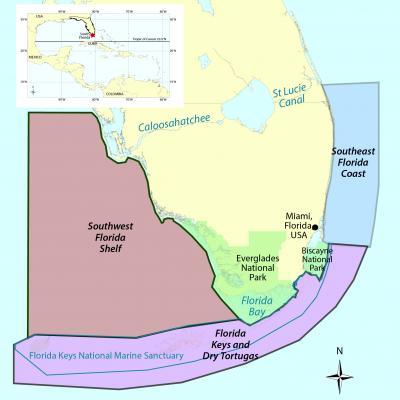UM-led research team contributes to the management of South Florida coastal environments

This is a map of the South Florida coastal ecosystem studied during the MARES project. Credit: Pamela Fletcher, Florida Sea Grant
A Florida-based marine research team has developed a unique formal process and modeling framework to help manage South Florida's economically important coastal marine environments. The MARES project (Marine and Estuarine Goal Setting), led by the National Oceanic and Atmospheric Administration's (NOAA) Cooperative Institute for Marine and Atmospheric Studies (CIMAS) based at the University of Miami (UM) Rosenstiel School of Marine and Atmospheric Science, successfully integrated both ecosystem science and societal benefits into a marine ecosystem support tool to help improve decision-making by natural resource managers.
The research team published their findings in 15 research papers in a special issue of the journal of Ecological Indicators – Volume 44, entitled: “Tools to support ecosystem based management of South Florida's coastal resources.” The results have been incorporated into the revised Guidance Document for the National Marine Sanctuaries' Condition Reports and are being used by the Our Florida Reefs community working groups, the National Parks Service, NOAA's Integrated Ecosystem Assessment efforts, and in undergraduate courses at Florida universities and colleges.
“One of the important aspects of this new suite of tools, which includes conceptual info-graphics, integrated ecosystem models and both human and ecological indicators, is that it's exportable technology,” said Peter Ortner, UM Rosenstiel Research Professor and Director of CIMAS. “It can be applied directly to the management of other coastal ecosystems.”
A MARES program for coastal North Carolina is under consideration and a full-day workshop on MARES will be held at next December's “Linking Science, Practice and Decision Making” conference in Washington, DC. The NOAA/Climate Program Office has recently announced an award to CIMAS applying the MARES framework entitled “Developing decision support tools for understanding, communicating, and adapting to the impacts of climate on the sustainability of coastal ecosystem services.”
South Florida has one of the most diverse ocean and coastal ecosystems in the United States, and is economically important to the local and state economy for tourism, commercial and recreational fishing, SCUBA diving, and other ocean-related jobs. The South Florida marine environment has degraded over the last century due to upstream and local human activity and coastal development. Sea-level rise and climate change are additional stressors that will put the long-term health of South Florida's valuable coastal resources at further risk over the coming century.
The study team, which included over 50 researchers from academia, state and federal government, was comprised of ecological scientists as well as “human dimension” scientists, such as economists, sociologists, and cultural anthropologists to evaluate the societal aspects of ecosystem management and protection. The coastal region studied included the waters from Martin County south to the Florida Keys and Dry Tortugas, the Southwest marine environment in the Gulf of Mexico from Lee County south to Florida Bay.
“Our large, collaborative team developed a conceptual modeling framework that explicitly focuses on the benefits humans receive from the ecosystem,” said Ortner. “The framework includes ecological indicators as well as human dimensions indicators to assess the level of services human society is receiving and wishes to continue to receive from the ecosystem, such as recreational opportunity and economic gain.”
The new conceptual framework allows natural resource managers to track how the ecological and human requirements are being satisfied and provides a flexible highly adaptive approach that allows for pubic involvement in the decision-making process. The MARES process is designed to reach a science-based consensus on the defining characteristics and fundamental regulatory processes of a coastal marine ecosystem that are both sustainable and capable of providing the diverse ecosystem services upon which our society depends. MARES was funded by the NOAA National Centers for Coastal Ocean Science
About the University of Miami's Rosenstiel School The University of Miami is one of the largest private research institutions in the southeastern United States. The University's mission is to provide quality education, attract and retain outstanding students, support the faculty and their research, and build an endowment for University initiatives. Founded in the 1940's, the Rosenstiel School of Marine & Atmospheric Science has grown into one of the world's premier marine and atmospheric research institutions. Offering dynamic interdisciplinary academics, the Rosenstiel School is dedicated to helping communities to better understand the planet, participating in the establishment of environmental policies, and aiding in the improvement of society and quality of life. For more information, please visit http://www.rsmas.miami.edu
Media Contact
All latest news from the category: Ecology, The Environment and Conservation
This complex theme deals primarily with interactions between organisms and the environmental factors that impact them, but to a greater extent between individual inanimate environmental factors.
innovations-report offers informative reports and articles on topics such as climate protection, landscape conservation, ecological systems, wildlife and nature parks and ecosystem efficiency and balance.
Newest articles

“Nanostitches” enable lighter and tougher composite materials
In research that may lead to next-generation airplanes and spacecraft, MIT engineers used carbon nanotubes to prevent cracking in multilayered composites. To save on fuel and reduce aircraft emissions, engineers…

Trash to treasure
Researchers turn metal waste into catalyst for hydrogen. Scientists have found a way to transform metal waste into a highly efficient catalyst to make hydrogen from water, a discovery that…

Real-time detection of infectious disease viruses
… by searching for molecular fingerprinting. A research team consisting of Professor Kyoung-Duck Park and Taeyoung Moon and Huitae Joo, PhD candidates, from the Department of Physics at Pohang University…





















